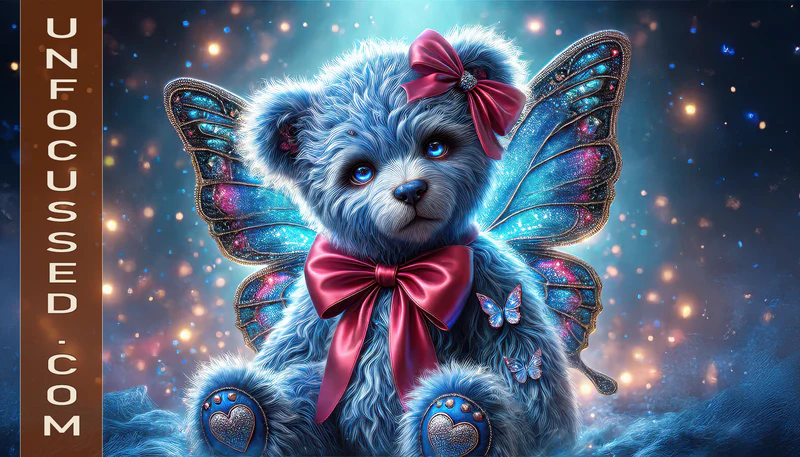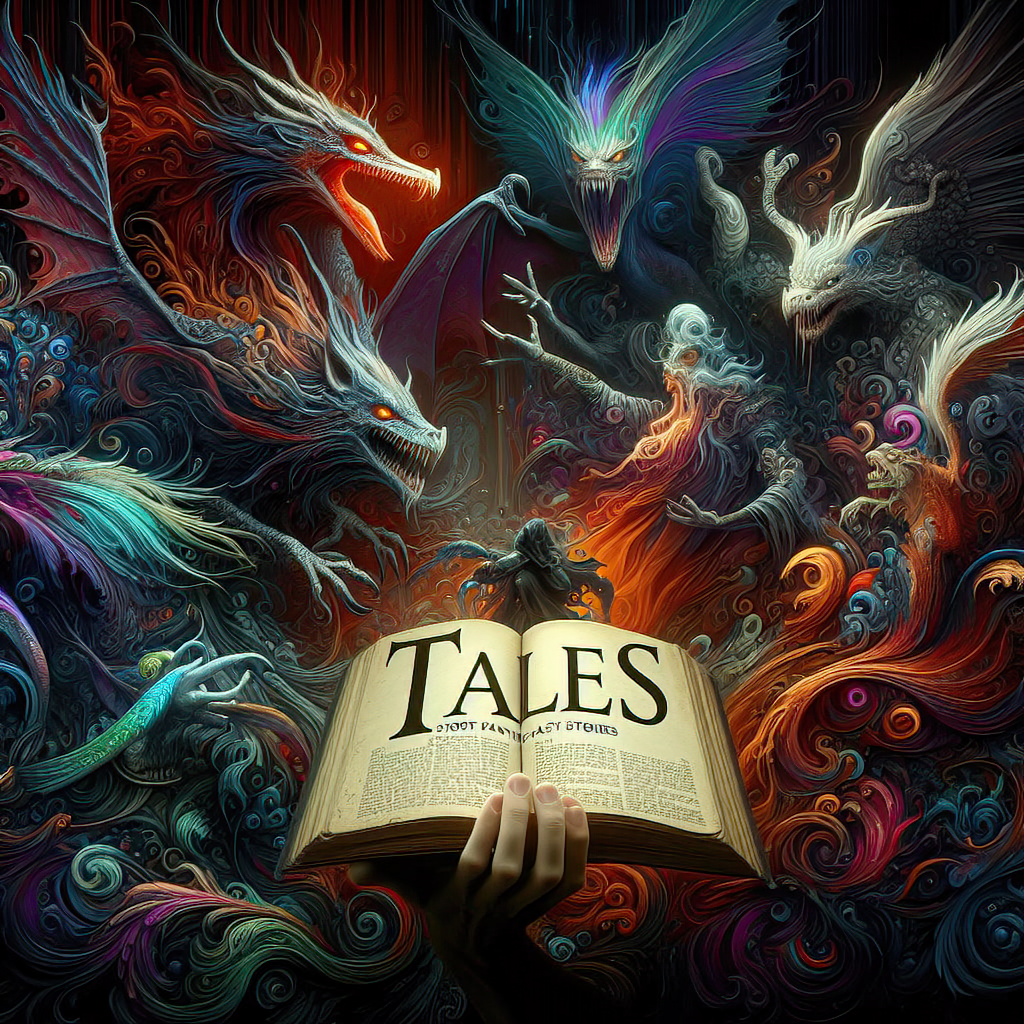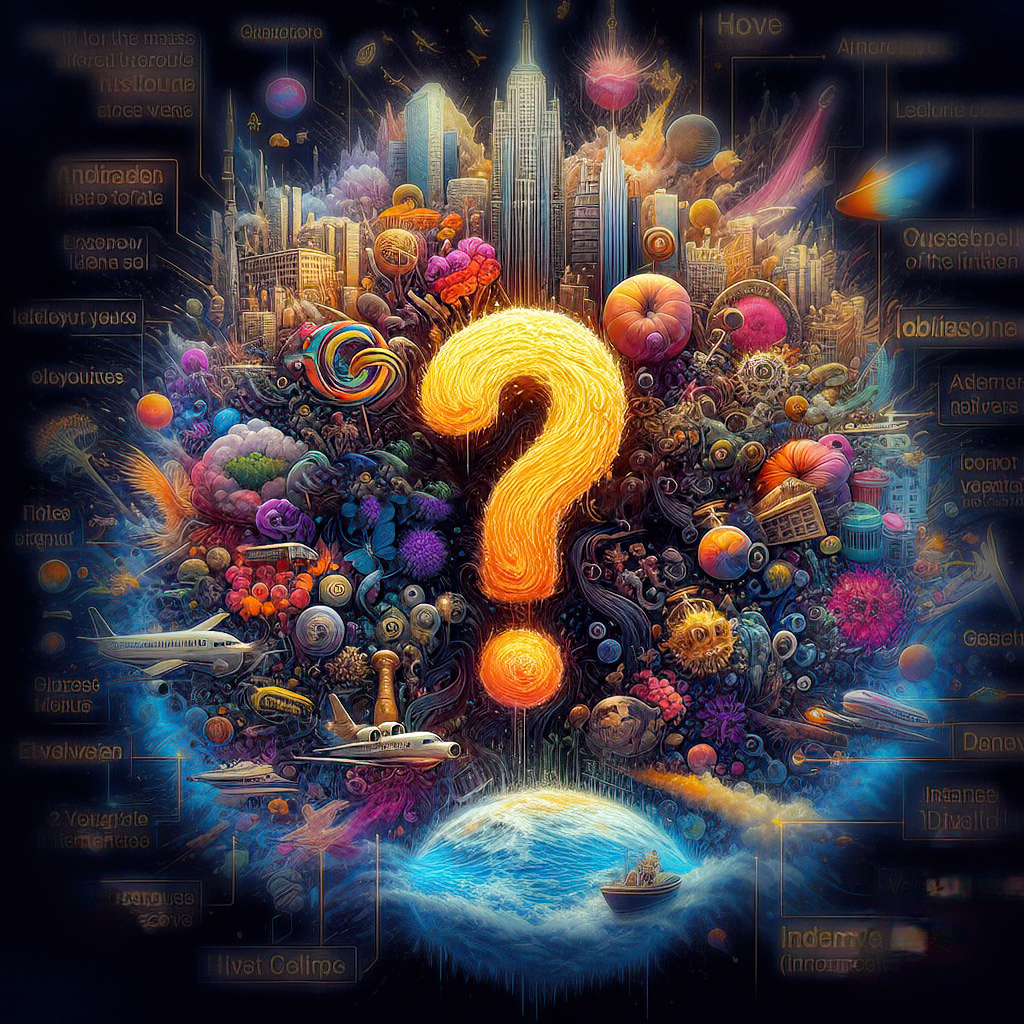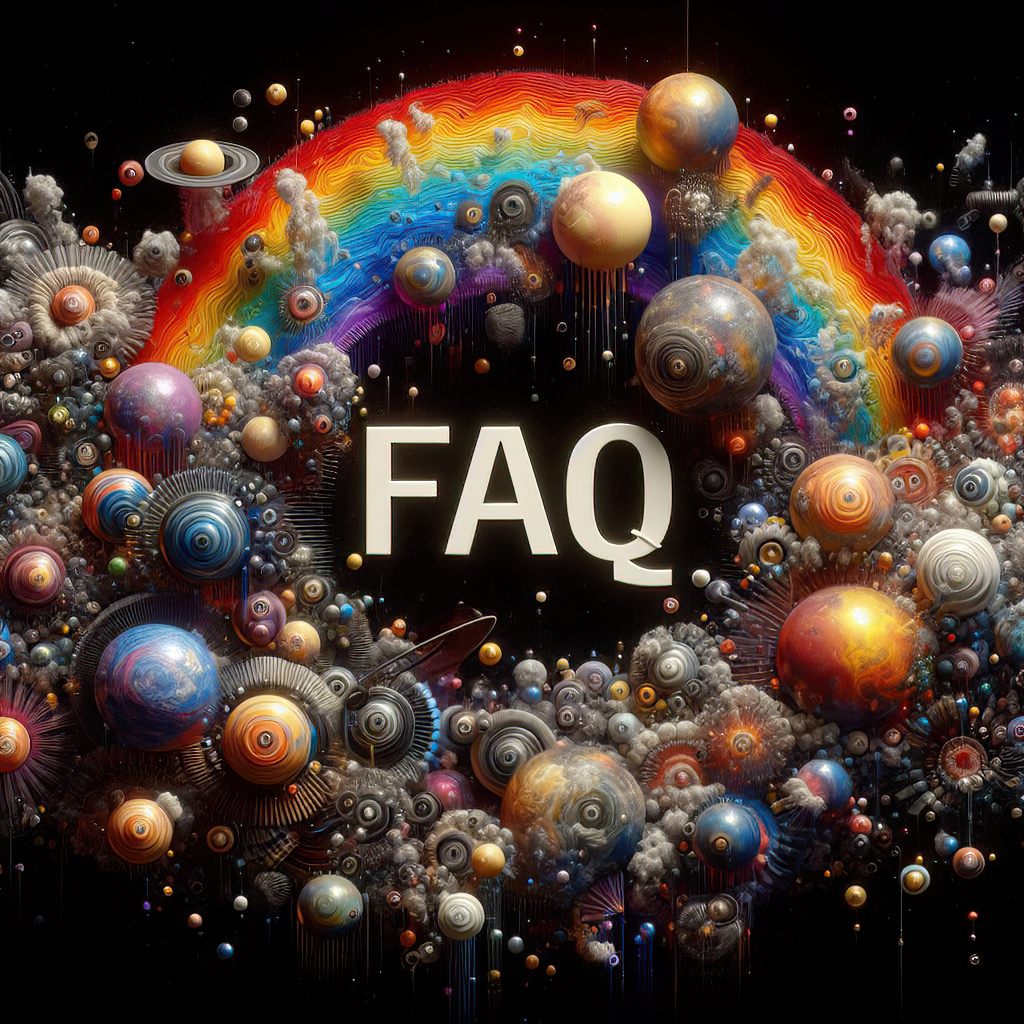
par Bill Tiepelman
Chant du ciel tacheté
Le problème de l'emprunt de magie Quand Pip réalisa enfin que le ciel vibrait dans une tonalité qu'il pouvait atteindre, il avait déjà promis un rappel à trois champignons différents et un message personnalisé à une fougère. Pip, un bébé hibou-dragon tacheté à l'attention d'une bulle de savon, adorait les applaudissements, les friandises et les raccourcis, pas forcément dans cet ordre. Il avait deux ailes neuves et brillantes, un ventre rond comme une guimauve grillée et la conviction profonde que les règles étaient faites pour les espèces sans charisme. Ce matin-là, la forêt luisait comme baignée de soleil et dorée à souhait. Pip, perché sur une bûche, se réchauffait les orteils en songeant à son programme du jour, qui consistait surtout à ne pas faire ce qui était raisonnable et à vivre des moments spectaculaires. Le moment raisonnable, c'était de s'entraîner à voler. Le moment spectaculaire, c'était de présenter sa composition originale : « Chant du ciel tacheté ». Il y avait juste un petit problème : il ne l'avait pas encore écrite. Un détail. Un vrai drame. « L’art, c’est 90 % de confiance et 10 % d’improvisation », annonça Pip à une boule de mousse, qui lui offrait le soutien silencieux que seules les plantes sphériques peuvent procurer. « Et puis, des en-cas. » Il remua les oreilles, déploya ses ailes coriaces et tenta un trille d’échauffement qui ressemblait à un piccolo perdant un duel avec un kazoo. Quelque part dans la canopée, un geai âgé cria : « Ça suffit ! », ce que Pip interpréta comme un compliment de la part de son public cible : les vieux grincheux. Voici Marnie, une chauve-souris à l'humour pince-sans-rire d'un contrôleur fiscal et au sens de la mode digne de la nuit. Elle était suspendue la tête en bas à une branche basse, telle une ponctuation après une mauvaise décision. « Tu vas essayer de chanter dans le ciel sans lui demander son avis ? » demanda-t-elle, impassible. « Audacieux. Illégal. Je respecte l'engagement envers le chaos ; je n'en cautionne pas les conséquences. » « Je ne vole pas le chant du ciel », dit Pip. « Je le sample . Très moderne. Très culture du remix. » Il agita une griffe comme un avocat présentant une faille juridique. « Et puis, le ciel est vaste. Il ne s'en apercevra pas. » Marnie cligna des yeux. « Le ciel observe tout . C'est littéralement l'état de surveillance de la nature. » Elle battit des ailes une fois et se posa près de lui. « Écoutez, maestro, vous pouvez apprendre les bases ou les apprendre à la dure. Le ciel vous enseignera, mais cela a un prix. » Pip fit semblant d'écouter, ce qui signifiait qu'il n'écoutait pas. La forêt vibrait désormais d'un bourdonnement sourd et profond, une mélodie lente et envoûtante qui lui pénétrait la peau et l'illuminait jusqu'aux os comme des lanternes. C'était comme se tenir devant une boulangerie au moment où le premier plateau de brioches à la cannelle s'élève dans l'air : une tentation irrésistible. Il leva le menton et capta la mélodie, claire et simple comme un sifflement. Elle s'emboîtait parfaitement dans sa gorge. Il chantait. Oh, il chantait ! Les notes jaillissaient comme des pièces d'un bocal fêlé – tintant, tournoyant, exubérantes. Les oiseaux interrompaient leurs plaintes. Les feuilles s'orientaient pour une meilleure acoustique. Même le geai grognon marmonna : « Eh bien, je n'en reviens pas… » et oublia de finir sa plainte. Les ailes de Pip vibraient de résonance, et la bûche bourdonnait comme si elle aussi attendait de participer à une mélodie entraînante. « Tu vois ? » haleta Pip entre deux phrases. « L’effort est un mythe inventé par des écureuils médiocres. » Il étira la dernière note en un ruban scintillant — et sentit une légère tension. La mélodie du ciel l'entraîna comme un poisson à l'hameçon. Il suffoqua. Son souffle suivant eut un goût de neige et de pluie. La brume dorée se teinta d'un bleu métallique, et l'air devint lourd, comme une pièce où une personne importante venait d'entrer. Le chant – le chant du ciel – se déroula plus ample, plus ancien, et totalement indifférent. Les nuages s'amoncelèrent avec la douce menace d'une bibliothécaire refermant un livre très lourd. Une voix résonna dans la clairière, ni forte ni grave, comme si elle avait cultivé sa patience pendant des millions d'années. « Petit emprunteur, dit-elle, as-tu posé la question ? » Pip, qui n'avait rien demandé, fit ce que font tous les artistes nés lorsqu'ils sont confrontés à leurs responsabilités : il sourit comme un ange au rabais et tenta d'abord de charmer. « Grand et beau ciel », chanta-t-il, « je ne faisais que rendre hommage à votre œuvre avec goût… » « Mignon », dit le ciel d'un ton de videur vérifiant une fausse carte d'identité. « Rends ce que tu as pris. » Le bourdonnement s'intensifia. Les ailes de Pip se déployèrent d'elles-mêmes, ses pattes s'agitèrent et il se retrouva à trente centimètres au-dessus du tronc, maintenu en lévitation par une musique impitoyable. Marnie grimace. « Intérêt », lui rappelle-t-elle, comme une amie qui l'a prédit sans l'ombre d'un doute. « Et surtout, ne prononce plus jamais le mot "culture du remix". La nature commence à exiger des droits d'auteur. » La mélodie du ciel pesait sur la poitrine de Pip. En dessous, il percevait un son plus faible, un fil fin et lumineux qui aurait pu être sa voix. S'il n'apprenait pas vite, il deviendrait un exemple à ne pas suivre, malgré une belle chevelure. La forêt se pencha. La boule de mousse se pencha aussi, ce qui est impressionnant pour une créature sans cou. « D’accord », murmura Pip. « Apprends-moi. » Le ciel marqua une pause, amusé. « Première leçon », dit-il. « On ne dirige pas la chorale tant qu'on n'a pas appris à écouter. » Le Chœur des Petits Bruits Pip n'aimait pas être cloué au sol, surtout à trente centimètres du sol. L'ironie était flagrante. La magie du ciel le maintenait en place comme une main invisible, et ses ailes, ces symboles flambant neufs de sa propre importance, tremblaient comme si elles réalisaient qu'elles étaient louées et non possédées. « Première leçon », avait dit le ciel, sur ce ton que tous les professeurs utilisent juste avant que vous ne regrettiez votre inscription. « Écoutez. » Alors Pip écouta. Ou plutôt, il fit semblant. Il pencha la tête, écarquilla les yeux et prit l'air de quelqu'un qui vient de découvrir la profondeur du monde. La forêt bourdonnait autour de lui, mais ce n'était pas l'harmonie cosmique et grandiose qu'il attendait. C'était… animé. Mesquin, même. Le paysage sonore de petites vies vaquant à leurs occupations avec un zèle déconcertant. Les feuilles chuchotaient des ragots sur les plantes qui photosynthétisaient trop bruyamment. Les fourmis se disputaient la gestion du trafic. Un coléoptère, quelque part, donnait une conférence improvisée sur la texture de l'écorce. Même la mousse marmonnait dans un dialecte ancien et humide, semblant surtout se plaindre de l'humidité. C'était moins un « chant sacré du monde naturel » qu'une « scène ouverte pour la végétation névrosée ». « C’est tout ? » murmura Pip. « Ce n’est pas possible. Le ciel veut que j’écoute ça ? » « Oui », dit Marnie, revenue avec une suffisance insolente. « Voilà à quoi ressemble l'univers quand on n'en est pas la vedette. » Pip lui lança un regard de côté si perçant qu'il aurait pu ouvrir des enveloppes. « Tu insinues que l'illumination ressemble à de la mousse qui se plaint de ses genoux ? » « Tu serais surpris », dit-elle. « Le secret, c'est de comprendre que ça ne te concerne pas. C'est à ce moment-là que tu commences à entendre ce qui se passe vraiment. » « Mais je suis adorable ! » protesta Pip. « L’univers peut bien faire une exception pour quelqu’un qui a un charme commercial. » « L’univers a une politique stricte de tolérance zéro envers les influenceurs », a déclaré Marnie. « Maintenant, tais-toi et écoute plus attentivement. » Il le fit. Et peu à peu – péniblement – le bruit commença à s'organiser, passant du chaos à une structure. Le cri du scarabée avait un rythme. Les fourmis marchaient en rythme. Même le murmure de la mousse avait une ligne de basse si profonde qu'elle faisait vibrer ses plumes. De minuscules sons s'entremêlaient, se bouclaient, se superposaient, pour former quelque chose de plus grand. Pip cligna des yeux. Pour la première fois, il perçut le rythme sous la brise, la façon dont la lumière du soleil frappait les feuilles en cadence, le doux pouls de la sève et de l'eau. Il n'entendait pas des notes ; il entendait une intention . Et quelque part en elle, faible mais constante, sa propre voix se nichait comme un fil rebelle — faisant partie intégrante du tissu, et non superposée. « Eh bien, je suis sans voix », murmura-t-il. « Ils chantent tous. » « Tu viens de t'en rendre compte ? » demanda Marnie, de nouveau suspendue la tête en bas, car la croissance émotionnelle l'épuisait visiblement. « Tout chante. Certaines choses chantent juste faux. » « Alors le chant du ciel… » commença lentement Pip. « C’est tout le monde ? » « Exactement. Vous avez essayé de faire un solo sur une symphonie. » Pip fronça les sourcils. « Mais comment suis-je censé me faire remarquer si je me fonds dans la masse ? » Marnie lui lança un regard compatissant, réservé aux âmes désespérément théâtrales. « Oh, mon doux nébuleux, ce n'est pas le problème. Tu te démarques déjà. Le problème, c'est que tu ne t'intègres pas. C'est très différent. » Il rumina cette pensée, qui avait un goût étrangement mêlé d'humilité et de saleté. Le bourdonnement de la forêt s'amplifia de nouveau – doux, bienveillant, indifférent à son histoire personnelle. Il essaya de fredonner, doucement cette fois. Sa voix trembla, puis se stabilisa lorsqu'il cessa de jouer la comédie et se laissa simplement porter par le courant. L'atmosphère changea. Le ciel, qui pesait sur lui comme un régisseur déçu, relâcha son emprise. « Mieux », gronda-t-il, sur un ton presque amusé. « Tu n’es plus insensible aux conséquences de tes actes. » Pip esquissa un faible sourire. « Alors… je suis libre ? » « Presque libre », dit le ciel. « Tu me dois toujours une chanson. Mais maintenant, tu l'écriras avec le monde, et non contre lui. » « Les collaborations, ce n'est pas mon truc », marmonna Pip. « Aucun des deux n’est une mise en garde, et pourtant… », dit Marnie. Pip expira, battant des ailes juste pour vérifier qu'elles fonctionnaient encore. Elles fonctionnaient, mais quelque chose avait changé. L'air semblait plus lourd de sens, plus chargé de… conscience, peut-être. Ou de culpabilité. Difficile de faire la différence quand on vient de recevoir une leçon de l'atmosphère elle-même. « Très bien », dit-il en étirant le cou de façon théâtrale. « J’écouterai. J’apprendrai. Je ne ferai plus qu’un avec cette chose. Mais je refuse de cesser d’être fabuleux. » « Personne ne te le demande », dit Marnie. « Juste… utilise peut-être ton charisme à bon escient. Par exemple, pour inspirer l’humilité. Sans le vouloir. » Cette nuit-là, Pip grimpa sur la plus haute branche qu'il put trouver. Les étoiles s'éveillèrent une à une, telles des critiques cosmiques prenant place. La forêt murmura dans ses mille langues endormies. Il inspira le parfum de la mousse, de l'écorce et d'une odeur qui ressemblait à de vieilles histoires, et se remit à fredonner. Cette fois, le son ne résistait pas au monde ; il s'y fondait. Les arbres s'harmonisèrent doucement. Le vent soupira d'une justesse parfaite. Un orchestre de grillons se joignit à eux, jouant dans l'ombre. Même la lune esquissa un lent signe d'approbation. Pip chantait, non pour impressionner, mais pour créer un lien. Ce n'était pas aussi brillant qu'une performance, mais c'était plus profond, plus chaleureux, plus… authentique. Et pendant un instant, les innombrables petits bruits de la forêt cessèrent d'être du bruit. Ils étaient la chanson. Le ciel tacheté au-dessus d'eux scintillait comme s'il souriait. Puis, bien sûr, un crapaud quelque part a croassé de façon complètement décalée et a gâché l'ambiance. « Chaque groupe a un batteur », a déclaré Marnie depuis une succursale voisine. « Ne le prenez pas mal. » Pip renifla. « Tu crois que le ciel nous écoute encore ? » « Oh, absolument. Mais maintenant, ça fait rire. » L'air nocturne bourdonnait doucement, et Pip crut – un instant seulement – percevoir un léger rire entrelacé aux étoiles. Il ne savait pas s'il s'agissait de moquerie ou d'approbation. Sans doute les deux. « Leçon deux », murmura faiblement le ciel. « L’humilité ne signifie pas le silence. Elle signifie savoir quand ne pas crier. » « Ça, ça va être imprimé sur un t-shirt », dit Pip, et le vent emporta son rire dans l'obscurité, où même le crapaud parvint à trouver le bon rythme — une seule fois. Encore sous les étoiles filantes Le lendemain soir, Pip avait accompli ce dont la plupart des créatures ne font que rêver : une rédemption partielle et une prise de recul. Malheureusement, les deux étaient désastreuses pour son image. Personne n’achète de peluches à l’effigie d’un héros moralement équilibré. Il regrettait d’être le petit rebelle et étincelant, celui qui avait l’air d’un fauteur de troubles et dont la voix était digne d’une bande originale. Mais il n’avait pas non plus particulièrement envie d’être vaporisé à nouveau par la haute atmosphère, alors il opta pour le développement personnel. « L’équilibre », se dit-il le lendemain matin en essayant de fredonner tout en mangeant une baie de la taille de sa tête. « La modération. La maturité. » Il s’arrêta pour lécher le jus sur son aile. « Mon Dieu, je déteste cet endroit. » « Tu t'y habitueras », dit Marnie, qui avait pris l'habitude de débarquer à l'improviste dès que son amour-propre était menacé. « En plus, si tu en as fini avec les punitions, tu comprendras peut-être enfin ce que le ciel attend de toi. » « Je croyais qu'il voulait que j'écoute », dit Pip. « Puis il a voulu que je collabore. Et après ? Une thérapie ? » « Tu pourrais bien en utiliser un peu », dit Marnie d'un ton enjoué. « Ton ego fait encore des promesses que ton âme ne peut tenir. » Pip fronça les sourcils, mais elle n'avait pas tort. La forêt était plus silencieuse aujourd'hui – ou peut-être était-il simplement dans un autre état d'esprit. Le bourdonnement des coléoptères ressemblait moins à un bruit de fond qu'à une percussion. Le bruissement des feuilles s'était mué en mélodie. Même la mousse capricieuse avait trouvé une forme d'harmonie. Et par-dessus tout, le bourdonnement du ciel persistait – patient, constant, ce doux vrombissement qui nous rappelait que la magie, comme le loyer, était due chaque mois. Puis vint la rumeur. Elle prit naissance dans les ronces, comme la plupart des mauvaises idées. Une volée de moineaux la transmit aux geais, qui l'exagérèrent jusqu'à en faire une légende, et au coucher du soleil, toute la forêt était au courant : le ciel préparait un concert à ciel ouvert . « Un concert ouvert ? » répéta Pip lorsque Marnie le lui annonça. « Genre… des auditions ? » « Un peu comme une jam session cosmique », dit-elle. « Chaque espèce a l’occasion de faire entendre sa voix. C’est ainsi que le ciel maintient son équilibre : tous les quelques décennies, chacun doit lui rappeler son existence. » Les plumes de Pip se hérissèrent. « C'est donc en gros une scène ouverte céleste ? » « Exactement. Sauf que si vous faites une erreur, vous n'êtes pas seulement hué et chassé de scène. Vous pourriez… disparaître. » « Oh », dit Pip avec un sourire trop large. « L'enjeu est de taille. Parfait. J'en suis. » « Tu n'es pas invité », a immédiatement déclaré Marnie. « Tu viens tout juste de sortir de ta période probatoire musicale. » « Et pourtant, » dit Pip, déjà satisfait de lui-même, « comme ce serait poétique si je bouclais la boucle ! Le ciel a pris ma chanson — maintenant je la lui rends, meilleure. Arc de rédemption, acte trois, les critiques vont adorer. » « Les critiques, dit Marnie, vont te dévorer. » Mais Pip avait déjà pris sa décision. On ne peut pas discuter de logique avec quelqu'un qui raconte sa propre évolution en temps réel. La scène du ciel Trois nuits plus tard, toute la forêt se rassembla dans une clairière si vaste qu'elle semblait sculptée par une force plus ancienne que les éléments. Les arbres se penchaient respectueusement, leurs cimes formant les murs d'un amphithéâtre naturel. Des lucioles tourbillonnaient au-dessus de nos têtes comme des projecteurs. Même la lune paraissait parée de ses plus beaux atours, brillant d'un éclat suffisant, comme si elle avait obtenu des places au premier rang. L'air était chargé d'anticipation et de pollen, deux substances enivrantes. Une à une, les créatures se sont mises en scène. Les grenouilles coassaient en harmonies tonitruantes. Les grillons chantaient en polyrythmies complexes qui auraient fait pleurer les musiciens de jazz. La brise elle-même soupirait à travers les roseaux, un solo mélancolique qui a suscité une ovation debout de la part des fougères. Même Marnie participait, ajoutant un écho obsédant qui dansait dans la canopée comme fumée et ombre. Et puis, comme toujours, Pip fit son entrée. Pas une simple entrée , un véritable moment . Il surgit avec la subtilité d'un feu d'artifice lors d'un enterrement, ses ailes captant le clair de lune comme du bronze poli. La foule laissa échapper un grognement collectif. On aurait pu entendre une fougère murmurer : « Oh dieux, c'est encore lui ! » « Bonsoir, chers spectateurs ! » déclara Pip en atterrissant sur un rocher couvert de mousse. « Je me présente humblement devant vous pour… » « Arrête de parler avant que le châtiment ne commence », siffla Marnie d'en haut. « — pour partager une leçon apprise ! » poursuivit Pip en l’ignorant. « Autrefois, je chantais sans écouter. J’empruntais ce qui ne m’appartenait pas. Mais maintenant, je rends ce que j’ai trouvé : ma voix, partagée, non volée. » Il hérissa les plumes de sa poitrine, inspira profondément et commença. Au début, son chant était discret – une seule note, claire et fragile comme du verre. Puis il s'est enrichi, se chargeant d'échos de tout ce qu'il avait entendu depuis : le murmure de la mousse, le bourdonnement des fourmis, le bruissement des feuilles. Sa voix montait et descendait au rythme du souffle de la forêt. Ce n'était pas parfait. Il y avait des craquements. Des hésitations. Mais c'était vivant. Authentique. Sa mélodie se faufilait dans la nuit comme un fil reliant toutes choses. Le ciel a écouté. Alors, comme par magie, une étoile filante traversa le ciel. Elle laissa derrière elle une traînée lumineuse qui semblait pulser au rythme du chant de Pip. Une étoile devint deux, puis dix, puis une pluie d'étoiles filantes, chacune brillant davantage à mesure que sa voix les enveloppait. La forêt retint son souffle. Même la mousse cessa de murmurer. Le ciel parla de nouveau, mais cette fois non pas sous forme de tonnerre ou de jugement. C'était un rire, doux et grondant, à la fois chaleureux et menaçant. « Tu as appris à écouter », disait-il. « Maintenant, écoute ce que tu as créé. » Le chant de Pip ne s'arrêta pas quand il cessa de chanter. Il continua, résonnant, se reflétant, se remixant sous l'effet du monde entier. Les grenouilles reprirent son rythme. Les grillons répétèrent sa mélodie. Le vent siffla en harmonie. Pour la première fois, la forêt ne se contenta pas de l'entendre ; elle lui répondit . Et c'était beau. Incroyablement beau. Tellement beau que quelqu'un va se mettre à vendre des produits dérivés. Il rayonnait. « Alors… j’ai réussi ? » « Techniquement parlant, » dit le ciel, « mais je conserve les droits d'édition. » « C’est juste », dit Pip. « De toute façon, je ne dépenserais tout que pour des en-cas. » Les rires se propagèrent à nouveau, se dispersant parmi les étoiles jusqu'à ce que toute la clairière resplendisse d'une douce lumière dorée. Des créatures se tournèrent vers lui — certaines amusées, d'autres admiratives, quelques-unes complotant déjà pour lui rendre hommage. Marnie atterrit à côté de lui en laissant échapper un petit grognement. « Tu te rends compte que ça veut dire que tu es de nouveau insupportable ? » « Oh, absolument », dit Pip en souriant. « Mais maintenant, je suis insupportable de profondeur. » « C'est en quelque sorte pire. » Ils contemplèrent les étoiles disparaître en silence pendant un moment. Ce n'était pas un silence apaisant — Pip avait la capacité de concentration d'un écureuil surexcité — mais c'était un silence agréable. Le genre de calme qui s'installe quand on a enfin renoncé à le combler. « Et maintenant ? » a-t-il fini par demander. « Et maintenant ? » demanda Marnie. « Maintenant, tu vis avec ce que tu as appris jusqu'à ce que tu l'oublies à nouveau. Alors le ciel t'apprendra quelque chose de nouveau. » « C’est ça le cycle ? » « C’est ça la blague », dit-elle. « Bienvenue dans le monde des Lumières. » Il hocha la tête, pensif. Puis : « Croyez-vous que le ciel s'offusquerait si je faisais un rappel ? » Marnie soupira. « Tu es incapable, par nature, de ne pas tenter le diable. » « C’est vrai », dit Pip, et avant qu’elle puisse l’arrêter, il sauta du rocher et déploya ses ailes. Sa voix s’éleva dans le ciel – plus légère, plus libre, emplie de tout ce qu’il avait été trop fier pour ressentir auparavant. La forêt se joignit à lui, cette fois non par obligation ou par curiosité, mais par joie. Le monde entier devint à la fois orchestre et public. Et pendant un bref instant, impossible, Pip crut sentir l'univers sourire – une note silencieuse d'approbation pure vibrant dans ses os. Puis la note s'évanouit, ne laissant derrière elle que le vent, des rires et un crapaud complètement déconnecté du temps. Mais c'était suffisant. La leçon (version abrégée, annotée et légèrement sarcastique) La morale, bien sûr, est d'une simplicité désarmante : on ne peut posséder ce qu'on ne comprend pas, et on ne peut comprendre ce qu'on refuse d'entendre. Pip a fini par comprendre que créer n'est pas conquérir, et que parfois, la voix la plus forte est celle qui, discrètement, donne le rythme. L'univers a son propre rythme. On peut danser dessus, ou se laisser emporter par lui, mais dans tous les cas, on fait partie intégrante de la mélodie. Et c'est peut-être là le paradoxe : tout le monde rêve d'être en tête d'affiche, mais personne ne veut répéter. Pip a simplement appris à la fois par la force et par l'humour. Ce qui, franchement, est la seule méthode qui vaille la peine d'apprendre quoi que ce soit. Quant au ciel, il continuait de bourdonner, amusé, attentif, et à peine inquiet de ce que Pip allait tenter ensuite. Car une chose était sûre : quelque part, d’une manière ou d’une autre, ce petit frimeur tacheté préparait sans aucun doute un remix. NOTE D'ARCHIVES : Des tirages, des téléchargements et des licences d'images de « Chant du ciel tacheté » sont disponibles auprès des Archives d'images Unfocussed . Idéal pour les collectionneurs d'art fantaisiste et les amoureux des créatures forestières à la moralité ambiguë. Ramenez la magie à la maison Si la chanson de Pip vous a fait sourire, rire ou même réfléchir à deux fois avant de voler des entités cosmiques, vous pouvez désormais emporter un petit morceau de cette histoire chez vous. L'œuvre « Chant du ciel tacheté » de Bill et Linda Tiepelman est disponible en plusieurs formats magnifiques, chacun promettant d'égayer votre intérieur – ou de vous reprocher gentiment de négliger votre créativité. ✨ Impression encadrée — Parce que chaque mur mérite une touche de fantaisie et de choix discutables. Impression sur métal — Audacieuse, lumineuse et absolument indestructible. Parfaite pour afficher l'ego de Pip en haute définition. 🧩 Puzzle — Plus de 500 occasions de remettre en question vos choix de vie, pièce par pièce. Une thérapie par le chaos, mais avec des ailes. 💌 Carte de vœux — Envoyez un petit mot, un rire ou une leçon de vie non sollicitée, dans le style approuvé par Pip. Quelle que soit la version choisie, souvenez-vous : l’art est simplement une autre façon de chanter les yeux ouverts. Et si vous entendez la forêt bourdonner en retour, ne vous inquiétez pas. C’est juste Pip qui essaie encore de chanter en duo.










